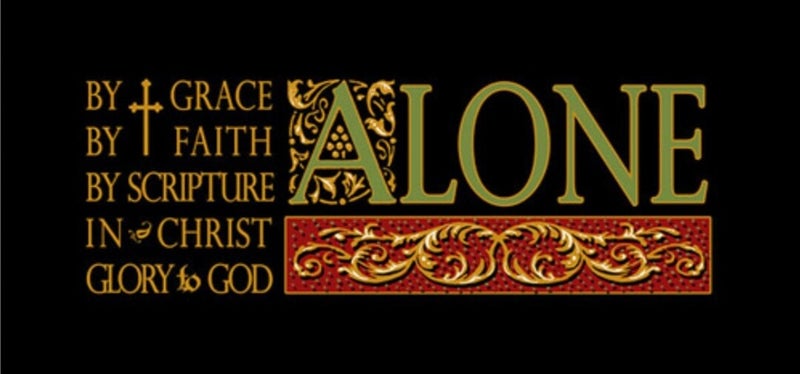
Sola Scriptura
The principle of sola Scriptura, or "Scripture alone," asserts that the Bible is the sole infallible authority in matters of faith and practice. It maintains that all ecclesiastical traditions and interpretations are subject to correction by the Scriptures, which serve as the ultimate standard for religious belief and conduct.
While other resources such as the creeds, confessions, and catechisms can provide guidance to the faithful, they are merely summaries of the main points of Scripture and defer to its authority rather than claiming their own or their authors' authority.

Sola Fide
The concept of sola fide, or faith alone, posits that individuals attain justification solely through their faith, independent of their good deeds. It's also worth noting while on the subject of faith: Faith is a gift and one can not come to faith without faith being delivered by The Holy Spirit.
While performing good works holds significance, their value extends beyond material benefits. They serve as tangible evidence of a redemptive faith, yet they do not directly contribute to earning salvation.

Sola Gratia
The principle of sola gratia, or grace alone, serves as a reminder that our salvation is bestowed upon us solely as a divine gift. This concept of undeserved favor stands in stark contrast to the notion that we can earn salvation, in part or in whole, through our own actions.
It is important to note that this does not imply that we should engage in immoral behavior simply because we are saved by grace. On the contrary, we are called to lead virtuous lives in accordance with the teachings of the Scriptures, expressing our gratitude to our benevolent God.

Solus Christus
The fundamental tenet of sola Christus, which translates to "Christ alone," asserts that salvation is solely attainable through the redemptive sacrifice of Jesus Christ. He serves as the exclusive intermediary between humanity and the divine. Without unwavering faith in Christ as the sole source of salvation, the path to redemption remains elusive.
Within the Reformation faith, Christ occupies a central position. Without His divine presence, our endeavors are rendered futile, while in His embrace, we are empowered to accomplish seemingly insurmountable feats. He assumes the threefold role of prophet, priest, and king, embodying the ultimate source of hope and unwavering trust.

Soli Deo Gloria
The concept of soli Deo gloria, which translates to "Glory to God Alone," emphasizes that all forms of glory should be exclusively attributed to God and no other entity. This notion is rooted in the belief that God is the source, the means, and the ultimate recipient of all things, including our salvation.
God created humanity with the purpose of glorifying Himself, and subsequently, He redeemed humanity for the same purpose. While we do not contribute to His glory in the sense of enhancing it, we have the privilege of participating in its completeness. It is impossible to augment a glory that is already perfect.
This doctrine serves as a fitting conclusion to the preceding four solas, as it underscores that God accomplishes the salvation of His people solely through the work of Christ, bestowed upon us solely by grace, received by us solely through faith, and guaranteed to us solely through Scripture.


